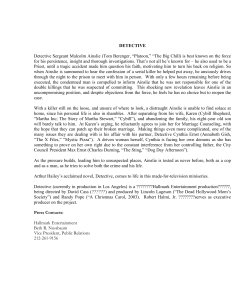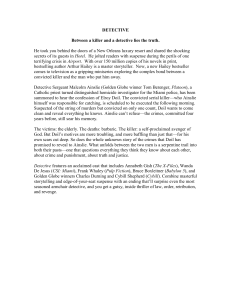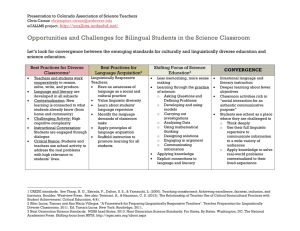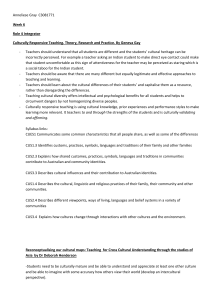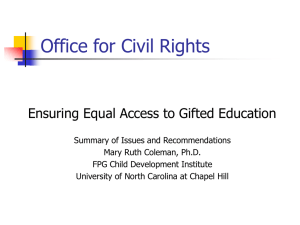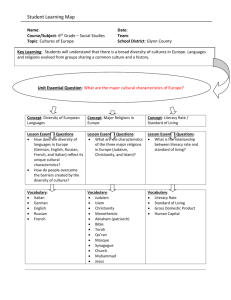North Ainslie Primary School Languages Policy, North Ainslie
advertisement
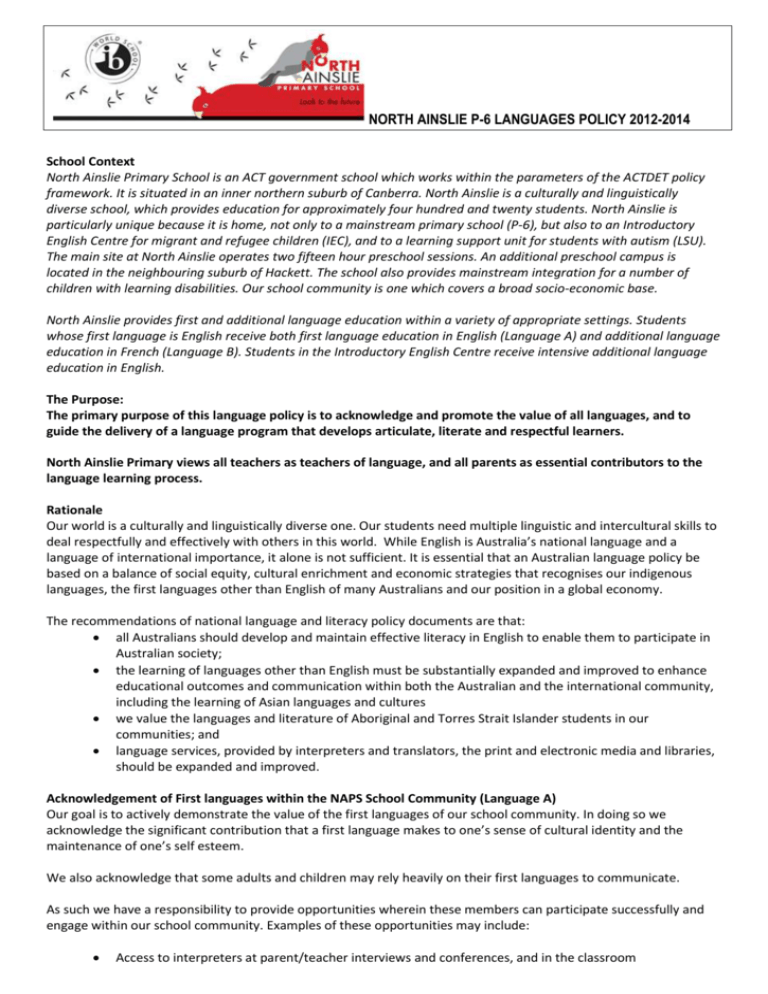
NORTH AINSLIE P-6 LANGUAGES POLICY 2012-2014 School Context North Ainslie Primary School is an ACT government school which works within the parameters of the ACTDET policy framework. It is situated in an inner northern suburb of Canberra. North Ainslie is a culturally and linguistically diverse school, which provides education for approximately four hundred and twenty students. North Ainslie is particularly unique because it is home, not only to a mainstream primary school (P-6), but also to an Introductory English Centre for migrant and refugee children (IEC), and to a learning support unit for students with autism (LSU). The main site at North Ainslie operates two fifteen hour preschool sessions. An additional preschool campus is located in the neighbouring suburb of Hackett. The school also provides mainstream integration for a number of children with learning disabilities. Our school community is one which covers a broad socio-economic base. North Ainslie provides first and additional language education within a variety of appropriate settings. Students whose first language is English receive both first language education in English (Language A) and additional language education in French (Language B). Students in the Introductory English Centre receive intensive additional language education in English. The Purpose: The primary purpose of this language policy is to acknowledge and promote the value of all languages, and to guide the delivery of a language program that develops articulate, literate and respectful learners. North Ainslie Primary views all teachers as teachers of language, and all parents as essential contributors to the language learning process. Rationale Our world is a culturally and linguistically diverse one. Our students need multiple linguistic and intercultural skills to deal respectfully and effectively with others in this world. While English is Australia’s national language and a language of international importance, it alone is not sufficient. It is essential that an Australian language policy be based on a balance of social equity, cultural enrichment and economic strategies that recognises our indigenous languages, the first languages other than English of many Australians and our position in a global economy. The recommendations of national language and literacy policy documents are that: all Australians should develop and maintain effective literacy in English to enable them to participate in Australian society; the learning of languages other than English must be substantially expanded and improved to enhance educational outcomes and communication within both the Australian and the international community, including the learning of Asian languages and cultures we value the languages and literature of Aboriginal and Torres Strait Islander students in our communities; and language services, provided by interpreters and translators, the print and electronic media and libraries, should be expanded and improved. Acknowledgement of First languages within the NAPS School Community (Language A) Our goal is to actively demonstrate the value of the first languages of our school community. In doing so we acknowledge the significant contribution that a first language makes to one’s sense of cultural identity and the maintenance of one’s self esteem. We also acknowledge that some adults and children may rely heavily on their first languages to communicate. As such we have a responsibility to provide opportunities wherein these members can participate successfully and engage within our school community. Examples of these opportunities may include: Access to interpreters at parent/teacher interviews and conferences, and in the classroom Access to intensive English language classes for students who come from culturally and linguistically different backgrounds Assisted access to first language education, either during or outside school hours (after hours ethnic/community languages schooling) Assisted access to native language resources and language skills within the classroom, to help facilitate the learning of students whose first language is not English Promotion of first languages and associated cultures at whole school gatherings such as assemblies and multicultural evenings Encouraged sharing of first languages and cultures in all classrooms, including within the PYP program of inquiry, and through parental involvement Dedicated additional languages program for students whose first language is English Celebrations of indigenous Australian languages and cultures/partnerships with indigenous community organisations Provision of bilingual staff and facilities for bilingual programs; and P&C support groups for newly arrived families e.g. the week 2 termly Welcome Morning Tea. Additional Languages Program (Language B) Language education enriches learners intellectually, linguistically and culturally, enabling them to communicate in multiple ways and to view the world from multiple perspectives. Teachers at North Ainslie believe that learning an additional language is important to the education of young people. They believe that additional language education: Develops the learner’s capacity to communicate and interact across languages and cultures Develops cognitive skills Extends literacy skills in both one’s own and additional languages Allows the learner to more easily decode language, make comparisons between languages and draw conclusions about how language works Strengthens the understanding of one’s own culture and identity and those of others, by helping the learner to understand global commonality and difference Develops social cohesion by creating linguistically and culturally aware citizens Affirms the knowledge and experiences of all students from culturally and linguistically different backgrounds and creates a comforting environment in which all students feel free to share these Promotes empathy for our students in the Introductory English Centre Reduces xenophobia Promotes tolerance, understanding and global capital Prepares learners for greater immersion in languages at high school Skills students in lingua franca Builds bridges to communities in near/neighbouring countries; and Supports trade and intercultural understanding. The Language Classroom at North Ainslie We believe that an effective and rich learning environment committed to languages education is one where all students: learn language, learn about language and learn through language are encouraged to learn more than one language are encouraged to develop a love of language and literature in all tongues are taught language by all teachers are encouraged to maintain and value their own first language and to value the first language of other students work in a structured and supportive learning environment, which encourages risk taking, experiment, inquiry and problem solving have the opportunity to engage in authentic and meaningful learning experiences work with texts and in activities which challenge and extend their understandings of language, themselves and the world around them participate in a balanced program of interrelated language activities across the curriculum, which include speaking and listening, reading and writing, viewing and presenting are taught language through an intercultural approach are exposed to modelling of rich, authentic language experiences are encouraged to read and interpret a broad range of literature reflecting a variety of cultures are encouraged to express themselves, orally and in writing, in a variety of media and situations have access to, and are taught through, a wide range of technological and information resources, including printed and visual texts, audio materials, world wide multi media information and communication systems are immersed in language are given time to reflect on their learning have the opportunity to take increasing responsibility for their own learning and for supporting the learning of others have access to language instruction which considers their multiple learning styles, interests and individual development understand the goals and purposes of learning activities, together with the criteria for assessment, which are articulated clearly beforehand;and receive constructive and specific feedback from teachers and peers. We commit to: Provide exposure to multiple languages, with a main focus on English as the language of instruction and on French as the additional language for all mainstream students Implement a PYP program of inquiry with a sound multicultural perspective which utilises the human resources within our school community Language A (English) English will be taught in a daily literacy block for all mainstream classes. Wherever appropriate, authentic and purposeful language instruction will be delivered through the units of inquiry. Language B (French) Kindergarten students will receive a basic introduction to the French language. Students from 7 years of age will receive a weekly minimum of 45 minutes of language B instruction, delivered by a specialist teacher. From Year 3 all students will receive a weekly minimum of 60 minutes of language B instruction, delivered by a specialist teacher, and, where possible, follow-up instruction by classroom teachers using online resources. Language B (English) - Northside Primary Introductory English Centre The NPIEC provides an introduction to the Australian school system and intensive English as an Additional Language/Dialect (EAL/D) program for children who speak minimal English. During the primary years, children acquire a second language in a similar way to first language acquisition. It is a continuous process and relies on sustained use, exposure, needs and experimentation. It may take a number of years for children to become fluent in their second language. Students are enrolled in the NPIEC in smaller class groups (around twelve students) for up to twenty weeks. Students may be enrolled for longer periods if they have suffered trauma or have had limited or disrupted schooling. Recommendations The North Ainslie Primary teachers recommend that we facilitate the school’s commitment to a strong and vibrant languages program by consistently adopting the following strategies: employing staff from varied linguistic and cultural backgrounds continuing to share and value all languages and cultures in an accepting environment employing specialist language B teachers accessing native language speakers whenever possible e.g. from community organisations, volunteer parents and students, teaching assistants in exchange programs providing consistent and equitable access to the school’s French program for all mainstream students investigating opportunities for immersion and methods of providing daily French classes for all mainstream students, including providing resources to enable classroom teachers to support the French program maintaining the continuity of the language B program through local cluster high schools developing school documentation which accommodates first languages further establishing a library of multicultural and multilingual resources (bilingual books, French readers, audio materials, smartboard sites and links, learning objects, CDs, DVDs, realia) and accessing community libraries (e.g. Companion House) supporting the teaching of language engagingly and authentically through the continued funding of professional development encouraging teachers’ participation in professional development opportunities (subsidised or funded) e.g. masters in language studies, Access Asia, overseas teacher exchanges, Alliance Française membership; and accessing grants and departmental funding to promote language education. This policy should be read in conjunction with the following curriculum references North Ainslie Languages B Curriculum P-6 (2008) IBO Primary Years Programme Language scope and sequence (February 2009) IBO Making the PYP Happen (January 2007) Adelaide Declaration on National Goals for Schooling in the Twenty First Century (1999) National Statement and Plan for Languages Education in Australian Schools 2005-2008 (MCEETYA) Asian Languages and Australia's Economic Future (COAG, 1994) Intercultural Language Teaching and Learning in Practice (ILTLP) Project. Leadership in Languages Education (APAPDC) (2007) Languages Matter (Conference, ACTDET, 21 February 2008) North Ainslie Literacy Plan and Curriculum P-6 (2005) – We need to update this one in the very near future. North Ainslie Literacy Plan 2012-2014 IBO Making the PYP Happen (December 2009) French Scope and Sequence K-10 (ACTDET, 2009) Australian Curriculum Version 3 (January 2012) ETD English as an Additional Language (EALD) Program Procedural Manual (December 2011) ETD English as an additional language or Dialect Policy (2011) Reviewed September 2012
